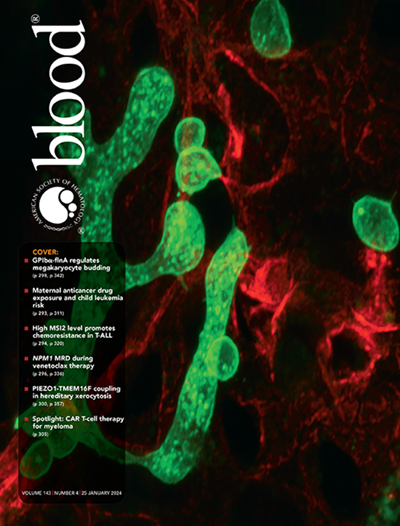Boosting CAR T-Cell Efficacy by Blocking Proteasomal Degradation of Membrane Antigens.
IF 21
1区 医学
Q1 HEMATOLOGY
引用次数: 0
Abstract
Chimeric antigen receptor (CAR) T cells exhibit high response rates in B cell malignancies, but most patients eventually relapse. A key mechanism of treatment failure is the loss or downregulation of tumor antigen expression, yet strategies to modulate cell surface levels of CAR T cell targets remain largely unexplored. Here we identify B cell maturation antigen (BCMA), a central CAR T cell target in multiple myeloma (MM), as a highly short-lived protein that undergoes K48-linked polyubiquitylation at the plasma membrane, leading to its p97-dependent degradation via the ubiquitin-proteasome system (UPS). This previously unprecedented mechanism of plasma membrane protein regulation enables significant enhancement of BCMA expression via proteasome inhibitors (PI). The clinically approved PI carfilzomib (CFZ) significantly enhances the efficacy of BCMA-directed CAR T cells against both PI-sensitive and refractory MM cells in vitro and in vivo. Notably, treatment of ten patients with CFZ under the compassionate use CarCAR protocol - after relapse following BCMA CAR T cell therapy - resulted in increased BCMA expression in all patients. However, clinical responses were observed only in those with residual and/or expanding CAR T cells, suggesting restored CAR T cell function. These findings provide a rationale for the use of CFZ treatment in relapsed or refractory MM following BCMA CAR T therapy, advocate for future trials combining CFZ with BCMA CAR T cells and provide a framework for exploring UPS-dependent degradation of other immunotherapy antigens.阻断膜抗原蛋白酶体降解提高CAR - t细胞疗效。
嵌合抗原受体(CAR) T细胞在B细胞恶性肿瘤中表现出很高的应答率,但大多数患者最终会复发。治疗失败的一个关键机制是肿瘤抗原表达的缺失或下调,然而调节CAR - T细胞靶细胞表面水平的策略在很大程度上仍未被探索。在这里,我们发现B细胞成熟抗原(BCMA)是多发性骨髓瘤(MM)的中心CAR - T细胞靶点,是一种高度短寿命的蛋白质,在质膜上经历k48相关的多泛素化,导致其通过泛素-蛋白酶体系统(UPS)的p97依赖性降解。这种前所未有的质膜蛋白调控机制使得蛋白酶体抑制剂(PI)显著增强BCMA的表达。临床批准的PI carfilzomib (CFZ)在体外和体内均能显著提高bcma靶向CAR - T细胞对PI敏感和难治性MM细胞的疗效。值得注意的是,在BCMA CAR - T细胞治疗后复发的10例CFZ患者,在慈悲使用CarCAR方案下治疗,导致所有患者BCMA表达增加。然而,临床反应仅在CAR - T细胞残留和/或扩增的患者中观察到,这表明CAR - T细胞功能恢复。这些发现为在BCMA CAR - T治疗后使用CFZ治疗复发或难治性MM提供了理论依据,提倡未来将CFZ与BCMA CAR - T细胞结合的试验,并为探索其他免疫治疗抗原的ups依赖性降解提供了框架。
本文章由计算机程序翻译,如有差异,请以英文原文为准。
求助全文
约1分钟内获得全文
求助全文
来源期刊

Blood
医学-血液学
CiteScore
23.60
自引率
3.90%
发文量
955
审稿时长
1 months
期刊介绍:
Blood, the official journal of the American Society of Hematology, published online and in print, provides an international forum for the publication of original articles describing basic laboratory, translational, and clinical investigations in hematology. Primary research articles will be published under the following scientific categories: Clinical Trials and Observations; Gene Therapy; Hematopoiesis and Stem Cells; Immunobiology and Immunotherapy scope; Myeloid Neoplasia; Lymphoid Neoplasia; Phagocytes, Granulocytes and Myelopoiesis; Platelets and Thrombopoiesis; Red Cells, Iron and Erythropoiesis; Thrombosis and Hemostasis; Transfusion Medicine; Transplantation; and Vascular Biology. Papers can be listed under more than one category as appropriate.
 求助内容:
求助内容: 应助结果提醒方式:
应助结果提醒方式:


